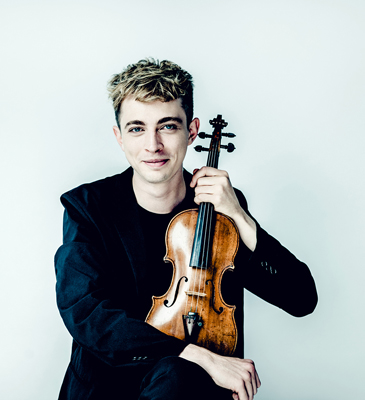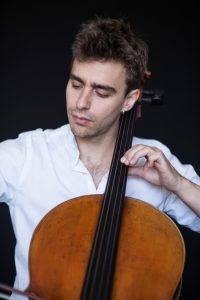Pau Codina, born in 1988 in Barcelona, is an accomplished cellist known for his remarkable talent and extensive performance history across Europe. His journey with the cello began at the tender age of five under the tutelage of Eulàlia Subirà in Manlleu, Barcelona. His passion and dedication to the instrument led him to prestigious institutions such as the Yehudi Menuhin School, the Guildhall School of Music and Drama, and the Chapelle Musicale Reine Elisabeth, where he honed his skills under the guidance of renowned cellists Louise Hopkins and Gary Hoffman.
Codina’s career is marked by performances in some of the most prestigious concert halls in Europe. He has graced stages such as the Wigmore Hall, Royal Festival Hall, Barbican Hall, Concertgebouw Amsterdam, Flagey, Bozar, Pau Casals Auditorium, L’Auditori de Barcelona, and the Palau de la Música Catalana Concert Hall in Barcelona. His versatility as a musician is evident as he performs both as a soloist and a chamber musician, captivating audiences with his profound musicality and technical precision.
As a soloist, Pau Codina has collaborated with numerous esteemed orchestras. His notable appearances include performances with the Franz Liszt Chamber Orchestra of Budapest, the Chamber Orchestra of Wallonie, the RTVE Orchestra in Madrid, the Barcelona Symphony Orchestra, and the Andorra Chamber Orchestra.
Pau Codina´s discography includes a recording of Saint-Saëns’ Suite Op. 16 for cello and orchestra with the Royal Philharmonic Orchestra of Liege, conducted by Christian Arming, under the label Fuga Libera. More recently, he performed Robert Schumann’s Cello Concerto in A minor, Op. 129, with the Camera Musicae Orchestra, conducted by Salvador Mas.
In addition to his performance achievements, Pau Codina has garnered numerous accolades and awards throughout his career. He is the recipient of the MBF’s Guilhermina Suggia Award and the Kronberg Cello Festival Schlosskonzert Prize. His talent and artistry have also been recognized at the Primer Palau Competition in Barcelona, where he won both the third prize and the Critique’s Award. Furthermore, he secured the first prize in the Concurso Permanente competition of Jeunesses Musicales of Spain.
Currently, Pau Codina is a member of several prominent ensembles, including the Esbjerg Ensemble, Oculi Ensemble, and Trio Fortuny. The Esbjerg Ensemble, Denmark’s oldest professional international chamber music ensemble, is renowned for its dynamic performances and commitment to contemporary and classical repertoire, contributing significantly to the Danish music scene.
Trio Fortuny, formed from the deep friendship between Codina, violinist Joel Bardolet, and pianist Marc Heredia, is particularly notable for its dynamic performances and unique musical projects across Europe. The trio has performed on major European stages and has recorded two albums in digital video format featuring works by Schubert, Brahms, Beethoven, Shostakovich, and Mendelssohn. Their collaborative efforts are influenced by esteemed musicians and mentors such as Ferenc Rados, Rainer Schmidt, Claudio Martínez, Gary Hoffman, Anton Kernjak, and Jonathan Brown.
Trio Fortuny’s performances have been featured at prestigious festivals, including the Wissembourg International Music Festival, Portaferrada, Temporada Ibercamera Girona, the Centro Nacional de Difusión Musical, L ‘Auditori de Barcelona, Bachcelona, and the Palau de la Música Catalana. Notably, they have secured an artistic residency at the Palau de la Música Catalana for three seasons starting from 2023-2024, further cementing their reputation in the classical music world.
Pau Codina’s contributions to music, both as a performer and collaborator, continue to inspire and influence audiences and fellow musicians alike. His dedication to his craft and his ability to seamlessly blend technical skill with emotional depth make him a standout cellist of his generation. As he continues to perform and expand his repertoire, Pau Codina’s impact on the classical music landscape is poised to grow even more significant.
 Kristina Edin, double-bass
Kristina Edin, double-bass







